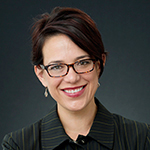By Amy Butler
 “Between stimulus and response, there is space. In that space is our power to choose our response. In our response lies our growth and our freedom.”
“Between stimulus and response, there is space. In that space is our power to choose our response. In our response lies our growth and our freedom.”
— Viktor E. Frankl
This past Friday I watched as my Facebook and Twitter feeds exploded with news of the Supreme Court’s ruling that every American has the same legal right to marry under the United States Constitution. From rainbow profile pictures and hashtags of #lovewins to protests about the Court usurping state’s rights and redefining marriage, everyone, it seemed, had an opinion.
Except when they didn’t.
Many Christian leaders and institutions spoke out in favor of the decision. Many of the usual suspects restated their opposition.
But then there was a third category, leaders or spokespersons for institutions who seemed to be doing their very best to make a statement without saying anything at all, as if they were dragged reluctantly into the national debate and would really prefer to have a conversation about the weather.
I’m sure you read some of these; they basically boil down to a speech your kindergarten teacher might have given on the playground, a hint of desperation in his voice: “There are lots of different people with different opinions about things. Sometimes we disagree. Let’s be nice to each other and try to get along [by not taking a definitive position on the matter].”
Maybe this sort of response works well in attempts to restore or maintain civility on the playground or among family members, or because you’re not really sure what to say and have errands to run before you pick up the kids and you can’t spend three hours debating on Facebook.
But as I read statement after statement of this kind from faith leaders and faith institutions, formal responses on behalf of the Church, I just got frustrated and, frankly, angry. I wanted to beg: as Christians and as leaders of the Church, please. Please have the courage of your convictions to speak honestly about what you believe.
I don’t know for sure why some seem unable to be clear in their positions, but I suspect the motivator is very often fear. Perhaps it’s a fear of folks disagreeing; maybe it’s a fear of losing the familiar; it could even be a fear of confronting our own bias. Whatever the motivation, I can still hear the words of Jesus from last week’s lectionary passage from Mark 4 ringing in my ears. The disciples, panicked by the wind and the waves hitting their boat, sigh with relief after Jesus stills the storm. His immediate question for them is rather pointed: “Why are you afraid?”
Why are we afraid?
Public positions that are not positions at all but instead desperate attempts to cordon off a nebulous, let’s-all-hold-hands-and-avoid-the-subject middle ground, while perhaps well-intentioned, are just not enough anymore. The world is watching the way we interpret the gospel message; let’s at the very least be honest about our convictions. We can say what we believe and why we believe it while still creating space for dialogue for those who disagree. People might get mad — they probably will. But the urgent mandate of our faith does not allow languishing in the middle ground anymore.
This past Friday I preached the opening worship for the Annual Mission Summit of the American Baptist Churches USA, and I opened with a brief history of the denomination. As with most mainline denominations in America leading up to the Civil War, Baptists were deeply divided over the issue of slavery. In order to preserve the denomination, abolitionists and defenders of slavery refused to address at the denominational level the most pressing moral issue of their day. The legacy of this inaction for Baptists and a majority of churches was denominational schism, an American church that to this day remains one of the most segregated segments of society. One might even say the cost of that inaction includes a society in which nine precious lives are lost at Bible study on a Wednesday night.
The cost of fear is too high.
No matter where you fall on the issue of equal marriage rights for all Americans, the call for open and ongoing dialogue on issues over which we disagree is even more loud and strident with this recent Supreme Court ruling. As people of faith, we must always look for ways to have the hard conversations that will bridge people of differing opinions.
But those conversations cannot move forward without an honest starting place. Say what you think and believe, and say it clearly.
Do not be afraid.
It’s from this place of honest declaration that we can finally begin conversations that matter.
